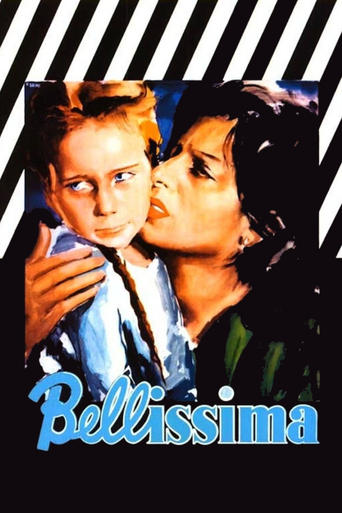

"Bellissima" is structured in a circular and ephemeral plot. Their conflict, which becomes stronger as a situation, is mimesis of reality, of stories so close and common but diversified. In short: the human desire to overcome poverty, even if we stimulate exploitation even more.The timeless character of this film made in 1951 by Luchino Visconti, is already clear in its synopsis: The story of Maddalena (a nurse), who inscribes his daughter Maria, in a contest that aims to elect the most beautiful girl in Italy. The contest represents a ticket to give the daughter a life that oscillates between dignity and luxury, being that mother-protagonist, ready to everything to guarantee the victory of the daughter.In a large part of this story that sometimes takes situations and absurd moments, facing a desire that borders the limitations of vision, rationality and absurdity when showing the starting points, play and finalize this saga. That is drawn by a mother motivated by the future of her daughter, this dramatic dimension that is characteristic to the film, if diluted wisely in moments of comedy. Maddalena's attitudes are laughable, all the more so as in the lack of artistic talent of her daughter. This laughs at the other, the role of a fool that plays this mother not to notice in the daughter who lacks other attributes, and the belief that the beauty of the girl, added to the interference of this mother, as in trying to buy the jurors or get someone inside the Production of the film that highlights the test of Maria, that this sum can interfere in the result and consecrate in the victory of Maddalena through the small daughter.With all the merits of a timeless story, and without regret the fact that the director had in hand a material very close to the neo-realist films that consecrated him, that is, to have something very close to the style that was customary to do, but that is Rejected in "Bellissima", approaching this story through the realistic bias, in which, personally, I consider that it was desirous to the producers of the film and to the director to present a more comprehensive aspect of the fable, considering the common character of this story, that happens and repeats itself In life, and which is now reflected on canvas, but which, in abandoning a reflection of this realism pertaining to a certain social reality, generates a filmic approach that equates maternal desires, however, disproportionate and invalid in face of class differences and consequently incapable of generating Changes, or results, how can you compete with a family that already has a wide advantage? This inequality of classes is mentioned and treated very superficially in the small plots in which they are presented, this minimizes the strength and potentiality of Visconti and Bellissima, since the approach in which it is presented (its form), makes it impossible for itself speech. The struggle to overcome class differences, through methods that reinforce and contribute to these differences. In truth, the mother does not struggle to overcome anything, she wants only to belong to something, and in the end, when she perceives this world of cruel differences that she admired and in which she ended up collaborating, it becomes, then, the moment of rationality and revolt of Maddalena. In portraying cinema as a microcosm of a prosperous world in advantageous possibilities, Visconti satirizes the film industry itself and human innocence in the face of its belief in possibility and belonging. This belief that induces the ability to use mechanisms, but is already dominated by commercial interests, which among others, result in the strengthening of class differences and simulate a fantasy world, such as the cinema and its benefits.The entire film is anchored by the magnetic and fascinating performance of Anna Magnani, who fills the entire screen with a fiery vitality and intensity that is almost impossible to look away. In 1951, she was one of the queens of Italian cinema and was already echoing all over the world. Anna was the favorite actress of Bette Davis, and Bette considered Anna's performance in "Bellissima" as: brilliant, uninhibited and full of immense power. There is hardly a moment in the movie where it is still or silent. Visconti, almost exclusively, records Anna in medium and full planes, giving her ample room for compositions and promoting seams from one end of the frame to the other.Between several scenes of fade-in and fade-out that stitch together the film, between jumps of episodic events that collaborate for the construction and the outcome of the plot, it calls the photographic proposal of Piero Portalupi and Paul Ronald, who basically establish a climate of life Obscure in the apartment of Maddalena, in contrast, the reflectors and dazzle of lights of the "Cinecittà", a directing of light that directs not only the convicted desire of Maddalena, but with only enlightened path that offers a perspective, a way out that life between Shadows Another great moment of mastery of this photograph is in the game between half light that illuminates faces or that highlight one among many others, a clear allusion to the pursuit of brilliance and own light that dialogue and much for the construction of "Beautiful".Although not the most interesting film of Visconti, and leaving aside many of the brands that have consecrated it, "Bellissima" is an interesting work and that dialogues with the contemporary world, and possibly dialogues with the future world, since between the social differences Which we both struggle to overcome, are often unconsciously reinforced through a selfish struggle that seeks only to save some and not realize that it will only result when we understand the need for a whole. Luchino Visconti was able to write for our eyes, an important social and cultural document that reflects on yesterday, analyzes the present and provides paths for tomorrow.
... View MoreLuchino Visconti's third feature film, Bellissima (1951) is without a doubt his key work. In this film Visconti's common themes and the basis of his art are portrayed. Bellissima is a very realistic film; the first observation of Visconti is the alienation of man -- that's why he locates his characters in social relations. Luchino Visconti was able to trap his characters into their own existence. The characters are prisoners of their own environments. Bellissima is a very beautiful film, but the beauty doesn't come from picturesque images or incredibly misery. The beauty comes from the way how the film is able to honor people in all situations. Bellissima is a tribute to life and innocence.A director announces that he needs a 6-8 year old girl to play a role in his film. Just like hundreds of women, Maddalena Cecconi drags her daughter to the audition. The dream of her daughter's career puts everything else aside; their family savings are spent to the girl's ballet lessons and new dresses. Maddalena is blinded by fame, fortune and romantic illusion. But in the end the cruelty and superficiality of the industry make her realize what really matters.A common feature in the films by Visconti is the escapism of drama. Anna Magnani's character escapes to the world of cinema, watching John Wayne and Montgomery Clift's adventures in Howard Hawks' Red River. Through cinema she denies her responsibility -- cinema is her redemption. This refers to Maddalena Cecconi's relationship between her daughter. She is completely alienated from her and by taking her to the world of cinema, she tries to escape the problematic milieu, combine reality and fiction; to make ugly look beautiful. But Maddalena is actually only changing her alienation to another form.The film exudes social reality, the one which forces one to act. It seems like the only way to keep your purity. But eventually one will leave this aesthetic life behind and realize the true dignity of man. Anna Magnani's character has been blind her whole life, for many years. But the cruelty of the film industry suddenly makes her realize this deep dignity. The ending of Bellissima is absolutely beautiful; the camera chases through the apartment and takes a close-up of the girl asleep. This is the first time fiction, fantasy and illusion have been forgotten; now only the true innocence and beauty are revealed. The true beauty of life.
... View MoreI was really disappointed with this movie. Perhaps it had something to do with Mama Roma which I had just watched. I did not find Magnoni realistic for the part. She was acting so hard it hurt me. I can understand a mother who pursues an acting chance for her child but this mother took it to excess and then threw away the opportunity she had "sacrificed" so much for. The ending of the movie was ridiculous - she returns from the screen test to find a contract waiting for her, and at 2,000,000 lira to boot, and can find nothing to say but that she is hurt that her daughter was used as a fun object and laughed at. With the brazenness and unfeeling attitude she displayed all through the film I could not find her rejection of a contract believable in the least.We were supposed to see her husband as a brutish lout but he just did not appear that way. He seemed the sensible parent, not like the mother. She made a show of showing the way she was beaten but there were no signs at all. And when she said to him at the end about slapping her it was not realistic at all. That part was just in the story I suppose to make her a repository of our sympathies. But it just did not work. In my opinion he was a much better parent than she.I am am not sure why people find Magnoni a compelling actress. She is earthy and annoying. She seems one-dimensional to me. I could not see much difference in her performances in this film and Mama Roma.
... View MoreA wonderful, poignant masterpiece by the great Visconti and Anna-the-Great-Magnani. On the surface, it is a simple story about a mother's obsession to use her little daughter's appearance to escape the poverty of post-war Italy. What transpires is the cruel truth about the beauty- and illusion-making industry (cinema), with all its inherent cynicism, at a time when hunger for the daily bread was equaled by hunger for fantasy and beauty.I've seen this movie only once, ages ago, and it still remains with me as one of the most unforgettable films I have ever seen. In a world that has seen hundreds of thousands of films that is no small feat.
... View More